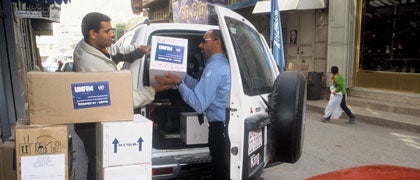
Message of UNFPA Executive Director, Dr. Babatunde Osotimehin
in commemoration of World Humanitarian Day 19 August 2015
Nearly 60 million people are forcibly displaced by conflict, war and persecution, the largest number since the United Nations was created 70 years ago in the ashes of the Second World War. And due to climate change, the frequency and severity of natural disasters is increasing, with more than 400 disasters last year alone.
Today on World Humanitarian Day, we express strong solidarity with the women, men, youth and children who are suffering from humanitarian emergencies worldwide. And we salute the humanitarian workers who strive to meet their needs and uphold human rights and dignity. UNFPA, the United Nations Population Fund, joins the #ShareHumanity campaign to tell the stories behind humanitarian crises.
Zainab and Nigo, were abducted by Boko Haram in Nigeria, but managed to escape. Their courage has been an inspiration to others. “Despite the fear, I did not lose hope,” Nigo said. In Afghanistan, Zarmina was abducted and forced into sexual slavery. Then, her mother organized to rescue her.UNFPA supports survivors like Nigo, Zainab and Zarmina, as we work to prevent and respond to gender-based violence. UNFPA also works closely with community members, who are often the best, most knowledgeable emergency responders.
Sita Paudel, a paralegal in Nepal, survived the devastating earthquake, and knew she had to take action. She became an organizer, bringing aid to remote villages and taking vulnerable women and girls to UNFPA-supported services. “I know how bad the situation is for women out there,” she said. In Colombia, Viviana was displaced by violence and became pregnant while still a teenager, and went on to become a youth leader. While fleeing Syria,Amir was shot and even declared dead. But he survived and is a volunteer at a UNFPA-supported centre.
UNFPA works to provide sexual and reproductive health services to ensure safe birth even in the most difficult circumstances. Chantal walked for four days to a refugee camp after fleeing Burundi. “I had expected the worst to happen,” she said. Instead, she gave birth safely at a maternity centre. Isra'a, a Syrian refugee, lost her baby when she could not afford the medical bills. But today, she is pregnant again and receiving care through UNFPA. To escape floods in Malawi,Alimanda climbed high into a tree when she was eight months pregnant. She survived and later gave birth to a healthy baby girl. In Vanuatu after Cyclone Pam, Katherine Silas sought family planning, so she could make her own choices and plan for the future. In Liberia, Comfort Fayiah gave birth in the rain, on the street, to twins, as Ebola overtook health workers, hospitals and clinics. UNFPA is working with partners to build sustainable and resilient health systems.
Today on World Humanitarian Day, and every day, UNFPA stands strong for the human rights and inherent dignity of every human being. To improve humanitarian effectiveness, we call for increased action and funding for sexual and reproductive health services, for tackling gender-based violence, and for the meaningful participation of affected populations, especially women and young people.

